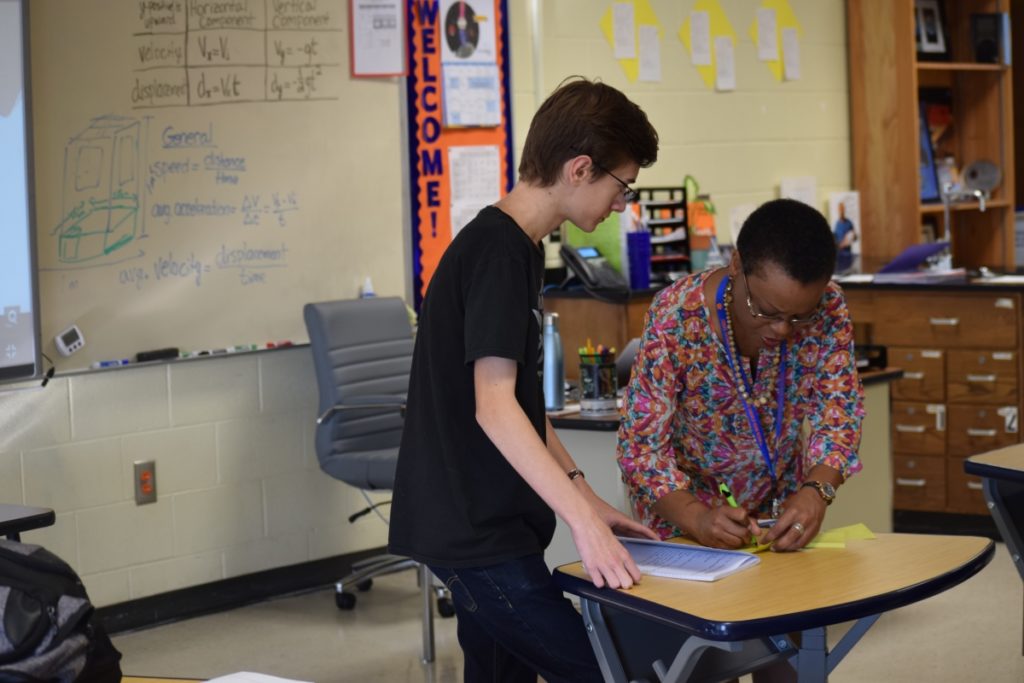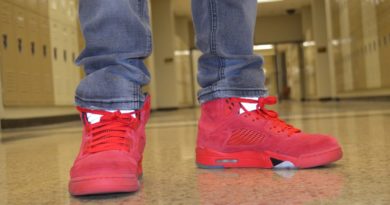
Harding Takes Off
As Ms. Wanda Harding asks her students to work in groups, a few continue working by themselves. She walks over to the lonely students and says “Engineers never work alone, it’s all about teamwork.” The students then move into groups.
Students were working on a chart designed by the American Society of Civil Engineers (ASCE). The ASCE works for the community in times of need like after natural disasters. This kind of real-world application is something that Harding can bring into her classroom because of her experience in the engineering field.
Now in her second year at Cedar Shoals, Harding formerly worked for NASA as a senior manager and was a Technical Director at the National Oceanic and Atmospheric Administration (NOAA). When she was a child, working for NASA was not a thought on her mind. In fact, she wanted to be a concert piano player.
“I had no idea I was going to work for NASA. Music was my first love, but when I found out you had to practice on the piano for eight hours a day, I decided I should find something else to do,” said Harding.
After receiving undergraduate and graduate degrees in electrical engineering, Harding pursued a career in education because she always wanted to teach. She later completed a master’s of art in teaching.
“When I went to Mays High School as a student in the math and science academy, the teachers said I was good at it, so I believed them,” said Harding. “When I got to Hampton University I was trying to be more competitive and go to the top, so I said to myself, ‘Don’t just stop at the bachelor’s. Go for the master’s as well.’”
Harding earned her undergraduate degree at Hampton University in Virginia and her master’s at Georgia Tech, one of the preeminent engineering schools in the country.
“When I first joined [NASA] my job was a systems engineer. System is a fancy word for an engineer who deals with a lot of disciplines, including electrical, mechanical, aerospace, and others. My first job was with the International Space Station. My job included traveling to work with other engineers in other countries like Italy,” said Harding.
Harding was later promoted to mission manager in her 4th year with NASA.
“The mission manager is responsible for making sure the rockets and spacecraft are integrated and ready to launch on schedule and successfully,” said Harding.
Harding, as a mission manager, led multiple mission teams and was part of the senior launch countdown for some of NASA’s key science and technology missions: the launch of Gravity Probe B in 2004, the Demonstration of Autonomous Rendezvous Technology (DART) mission in 2005, and Mars Science Laboratory – Rover Curiosity in 2011.
Other missions that Harding participated in included the Lunar Reconnaissance Orbiter, Tracking and Data Relay Satellite System, Interstellar Boundary Explorer, and the Joint Polar Satellite System.
The position of mission manager carries great responsibility with NASA’s research and resources costing millions of dollars.
“Each mission is a huge investment, and the decisions I made had to be done with that in mind.There were critical decisions I had to make to ensure a successful launch,” said Harding.
Harding’s engineering experience informs her as a teacher. For example, she learned the value of patience at NASA, so dealing with some high school students who are less enthusiastic about learning doesn’t throw her focus off of teaching.
“I recognize my students will not always be in high school, and will one day be working and leading in some capacity as well. I don’t mind waiting for them to catch up and realize the importance of their education now as preparation for their own future,” said Harding.
“The link between Piedmont College and Clarke County opened up a path for me to teach, and Cedar Shoals gave me an offer, and I accepted so this is why I’m here now,” said Harding.
“I hope my real life experience will encourage students to do better than they expect of themselves,” said Harding.



